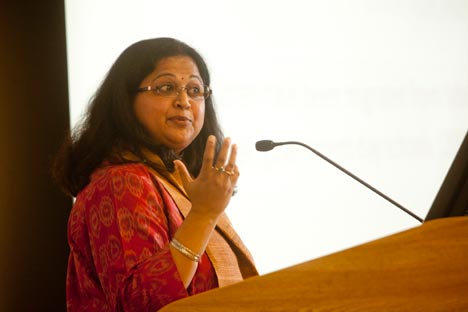
Many countries in the developing world have made progress in health and other fields in recent decades, but large numbers of people still struggle to survive every day, a panel of experts said Friday at the opening panel of Duke's "A World Together" conference on global development.
Michael Merson, director of the Duke Global Health Institute, pointed toward health disparities in our "new converging world," citing chronic disease, climate change and inadequate health systems as key issues. Just as in the United States, tobacco use, obesity and cardiovascular diseases have become major health challenges in the developing world.
"There is no longer any doubt how important health is to development. Security threats and health issues impact development. They are intertwined," Merson said.
Maya Ajmera, who graduated from Duke with a public policy master's degree, told the story of how she founded The Global Fund for Children, an organization that gives small grants to community-based organizations working with street kids, child laborers, orphans and other young people.
She said her effort seeks to use relatively small amounts of capital to help grassroots organizations grow and become sustainable. "There are about 250 million children who are invisible," Ajmera said. "Community-based NGOs can reach them. So we gave them money to reach even more children and stood by them for three to 10 years."
The Global Fund for Children now supports hundreds of non-governmental organizations in more 70 countries, developing social entrepreneurs -- some of whom were street children themselves -- to help their own communities. Much of the work focuses on girls.

"If you educate a girl, you educate her village," Ajmera said, adding that she is also seeing a growing problem of young men who are unemployed and languishing in urban areas.
Leela Prasad, the director of the Duke Center for Civic Engagement, shared her findings on education in rural India, where more children are enrolled in formal education but are still illiterate at the fifth-grade level.
"The quality of education is a problem in rural and urban areas," Prasad said. "We see a dramatic change in the quality when the government invests in schools, but when the government withdrew support, the levels went back down."
Prasad described how transforming one school with paint and murals had an immediate positive effect on the community, discouraging vandalism and increasing adult literacy. She said it is important for those in development to view the children themselves "as agents of change."
Greg Van Kirk, a former Peace Corps volunteer in Guatemala who now works with the organization Ashoka, said he finds success in supporting grassroots endeavors in local communities. He advised students to "think big, work small" when considering development work as a career.
"Focus on your desired outcomes and work your way back," said Van Kirk, who left his career as an investment banker to work in micro-consignment, a business model that shifts risk away from local entrepreneurs. "There is a tapestry of solutions and we should leverage off each others' models."
He and Ajmera also participated in a weekend Ashoka U conference that took place simultaneously on Duke's campus, with some of the sessions overlapping between the two events.